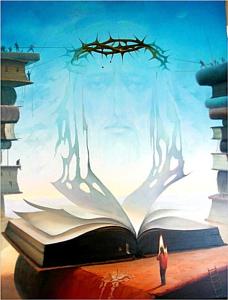The Daoist philosopher Zhuangzi (370-287 BCE) told this story:
Once three friends were discussing life. One said: “Can people live together and know nothing of life, work together and produce nothing? Can people fly around in the air and forget to exist, forever and ever?”
The three friends looked at each other and burst out laughing. They had no explanation, and so they were better friends than before.
Then one of the friends died.
Upon hearing of the death, Confucius sent a disciple to help the two remaining friends chant the funeral obsequies. Upon arrival, the Confucian found that one of the friends had composed a song, and the other was playing upon a lute.
The two friends sang:
“Hey, Sung Hu, where’d you go?
Hey, Sung Hu, where’d you go?
You have gone where you really were all along,
And we are here, damn it, we are here!”
When the Confucian heard this he burst into the room and said, “May I inquire where you found this in all the books of funeral obsequies, this silly singing in the presence of the dearly departed?”
The two friends looked at each other, laughed, and said:
“Poor fellow! He doesn’t know the new liturgy!”
(Adapted from a translation by Thomas Merton)
Ideally, a Humanist congregational gathering is a religion-neutral zone. When I say “religion-neutral,” I’m not being ironic or clever. A Humanist liturgy is not an anti-religion zone or a no-religion zone. It is a place without sectarianism. The thought of such a liturgy may be, like the new liturgy for the dead friend in Zhuangzi’s story, shocking to the orthodox. But it is shocking only in concept. In execution, it is, again as Zhuangzi relates, fresh and heartfelt. The congregation may feel like the three friends:
They had no explanation, and so
they were better friends than before.
New liturgy and fresh thinking avoids cliches. The Confucian (so to speak) in the room may want to hear the old words—words such as “prayer,” “hymn,” “god,” “soul” . . . but there’s a reason “obsequies” easily become obsequious. That reason has to do with mind-forged manacles.
Why ask the Muslims, Hindus, Earth-Centered practitioners, atheists, Skeptics, Cynics, Stoics et cetera in the room (and why shouldn’t they be in the room?) to listen to the language of their would-be or some-time oppressors? Sure, those for whom Christian liturgical language makes sense will be baffled, asking, “May I inquire where you found this in all the books?”
Humanists will have a chuckle. Our liturgy arises from the old questions asked in new ways, ways we hope lead to lives of deeper meaning and authenticity. (Authenticity is, I think, the point of Zhungzi’s story.) Isn’t the question at every funeral,
Hey, Sung Hu, where’d you go?
Hey, Sung Hu, where’d you go?
And isn’t the deepest emotion at every funeral this one:
And we are here, damn it, we are here!
Religion-neutral isn’t religion free. (Nor is it anti-Christian merely because there’s nothing of Christianity in it.) It’s a space where, in the face of the oldest questions, we sing a new song, a song of inclusion and freedom. 














